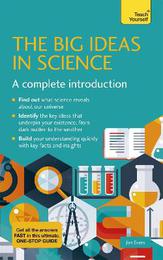
|
The Big Ideas in Science: A complete introduction
Paperback / softback
Main Details
| Title |
The Big Ideas in Science: A complete introduction
|
| Authors and Contributors |
By (author) Jon Evans
|
| Physical Properties |
| Format:Paperback / softback | | Pages:288 | | Dimensions(mm): Height 216,Width 134 |
|
| Category/Genre | Popular science |
|---|
| ISBN/Barcode |
9781529397956
|
| Classifications | Dewey:500 |
|---|
| Audience | | Tertiary Education (US: College) | | General | |
|---|
|
Publishing Details |
| Publisher |
John Murray Press
|
| Imprint |
Teach Yourself
|
| Publication Date |
23 January 2020 |
| Publication Country |
United Kingdom
|
Description
The ability to understand science as a totality - matter, space, energy, life, weather, information and the future - will enhance your understanding of all the challenges facing humanity, as well as allow you to go deeper into specific technologies. This book, complete with worked examples and key facts, forms a course which will take you from novice level to a competent understanding of the hottest topics in science. It includes step-by-step explanations of subjects as complex as the birth of life and plate tectonics, with suggestions for further reading and summaries to help you understand the key points. Chapters cover: the Big Bang, the solar system, the birth of life, evolution, DNA, the genome, genetics and cloning, the structure of Earth, earthquakes and volcanoes, weather, energy, the microprocessor, artificial intelligence, space exploration, scientific fraud, scientific controversies, climate change, and the future of science. ABOUT THE SERIES The COMPLETE INTRODUCTION series from Teach Yourself is the ultimate one-stop guide for anyone wanting a comprehensive and accessible entry point into subjects as diverse as philosophy, mathematics, psychology, economics and practical electronics. Loved by students and perfect for general readers who simply want to learn more about the world around them, these books are your first choice for discovering something new.
Author Biography
Jon Evans is a freelance science writer who has written extensively for many science publications, including New Scientist.
|